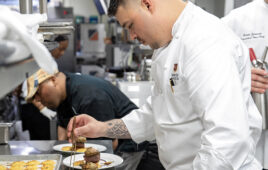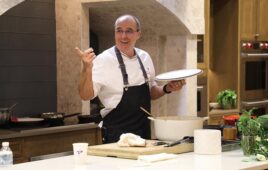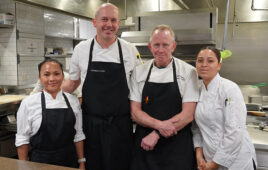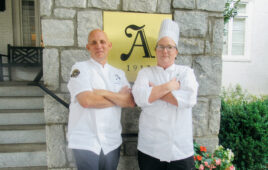Myers Park CC’s long-standing culinary excellence hasn’t missed a beat after a seamless master-chef-to-master-chef transition that now has Executive Chef Jason Hall, CMC, at the helm.
Since its inception in 1921, Myers Park Country Club has always been considered one of the finest private facilities in Charlotte, N.C. The club is located in the well-established neighborhood of the same name, where many of the textile, banking and utility leaders who helped to establish the Piedmont Carolinas as a major manufacturing region in the early twentieth century have resided.
The recipient of “Platinum Club of America” and “Five-Star Private Club” recognition, Myers Park CC has always had the reputation for great food. This year, Executive Chef Jason Hall, CMC, has taken over what was already a well-oiled machine and hit the ground running. Chef Hall was kind enough to share his thoughts on how he has strived to continue, and build on, his new club’s tradition of excellence.
C&RB: Jason, I have friends in Charlotte, and no lie—they say the best restaurants in the city are at Myers Park. With multiple dining concepts, how have you come to a comfortable place with committees and the management team for décor, menu design and utilization of space?
| CHEF PROFILE: Jason Hall, CMCCurrent Position: Executive Chef, Myers Park Country Club, Charlotte, N.C. (2015-Present) Previous Experience: • Executive Chef, Hammock Dunes Club, Palm Coast, Fla. (2006-2015) • Executive Chef, The Dunes Golf and Beach Club, Myrtle Beach, S.C. (2001-2006) • Chef, Café Sonoma, Wilmington, N.C. (1999-2001) • Line Supervisor, Portage Country Club, Akron, Ohio (1996-1999)Education: Associates Degree in Specialized Technology, Pennsylvania Institute of Culinary Arts (1995) Awards and Certifications: (Personal website: www.JasonHallCMC.com) |
Hall: First, thank you—it’s certainly nice to hear that recognition, and it reflects how the staff here, both in the front and back of the house, strive to go above and beyond in their performance on a daily basis.
After I arrived here, one of my first tasks for the F&B committee and the Board of Directors was to look at our dining outlets and create mock menu concepts for each outlet, based on my vision of the future changes and renovations we are about to begin. For a fresh set of eyes, it was really just watching how the staff in each area worked, evaluating where they struggled and where they were successful, and thinking about a variety of menu concepts. I said to everyone upfront that “my goal is that all of [the membership] will eat here for every meal and not go to the pizza shop down the street or the fine-dining restaurant downtown; they will come here for all of those experiences, and we will exceed them!”
We have a high-volume casual/family-style outlet and a formal outlet, and we are building a pub. I wanted to keep the high-volume outlet unique, with modern Southern flavors that were easy to produce. The pub is a new addition, with an upscale bar-food concept and pizza, and with multiple local beers on tap to retain the sports crowds.
The formal kitchen is already producing high-quality items, but I’m pushing the envelope with some of the food there, to keep it moving forward.
I laid out my vision for each of these areas in detail, explaining the food and service styles that I thought would be best, and everyone has been very receptive to it all. And for each area, we’re adding unique vegetarian dishes to fit the themes.
C&RB: Clearly, formal dining is in no danger of dying at Myers Park. You still have tableside and French service for just about everything. What are you doing so successfully in this area that other clubs have given up on in recent years?

With a solid brigade system already established at Myers Park by his predecessor, Scott Craig, WCMC, Chef Hall (center) was able to immediately focus on helping the club to move forward into producing more in-house specialties.
Hall: We are very fortunate to have our formal outlet, where the menu changes every 30 days. We do offer prime steaks and some traditional items on the standard side of the menu. We do a modern shrimp cocktail for each menu cycle, and change out our “house salad” each time as well. This month, a garde manger-made strawberry vinegar is our new house dressing.
I think the fact that the formal menu changes very often gives us an advantage over the local high-end restaurants, which don’t have the ability to change every 30 days. The formal line here is high-end/modern, with 8 to 12 components in some cases, and we do a lot of French service now.
At my last club, we ran formal and casual off the same line, because that was our only option. But that only works on a good day; they are two different dining styles, and timing was always an issue. But here, we are able to separate the lines by having a kitchen that does it completely independently of the casual preparation downstairs. I believe that this independence, and the understanding of the membership to treat the two areas as separate restaurants, is what’s responsible for our success.
C&RB: This is your fourth club-chef position, and I am sure you have seen things come and go from the banquet side. What are some trends you are seeing in the catering/party/banquet area?

One-on-one exchanges with chefs at banquet stations helps to make diners’ experiences “overwhelming and memorable,” Hall believes.
Hall: I still see the trend of small plates. We do a lot of “minis” from the pastry department, and we also do many heavy hors d’oeuvres and many stations and dine-around concepts. I think this gives the guest more variety and a great one-on-one experience with the cooks and chefs who can provide additional detail about the items, if they are manning a station. While it is higher in labor to do these, the experience from a member’s standpoint is overwhelming and memorable.
C&RB: Chef, you received your CMC Certification in 2012. What an accomplishment! You had to be mentored early on at the highest level to even be considered as a candidate. What are some of the learned lessons that resonate from your years developing the necessary skills?
Hall: You are correct—I was mentored early on, and continued that mentorship throughout my career. I was fortunate to work at my first club under James Corwell, CMC, who was at that time training for the exam. I followed him all over the country and was selected as his successor at The Dunes Golf & Beach Club.
In early 2000, I met Kevin Walker, who was training to take the CMC exam. After he passed it and then moved to Cherokee Town and Country Club, I spent as much time as I could there, working with his staff and assisting at all the CMC dinners he did there for eight years. It was through those events that I was able to build relationships with the Certified Master Chefs and let them see that I was very eager to take the exam myself at some point. This led to exposing my skills to many different CMCs and gaining critiques that helped to shape my development of cooking and thinking.
As for lessons, the first one is to never give up on a goal. I failed the exam in 2010, but made it to the last day. That just made me push harder and re-think my program and the way I approached the test when I went back to be successful in 2012.
Other lessons learned include respecting the food, showcasing the items that you are cooking, and thinking about how they should best be treated. And each day, you should set yourself up for success through items that can be worked into a normal day at the club: proper mise en place, organization, detailed lists/sketches, and a plan of action. You have to have a vision and be able to convey that to your apprentice and to coach them, much like you do with your staff, every day, to reach a goal.
C&RB: You followed another Master Chef, Scott Craig, WCMC, at Myers Park, after he moved to the Chevy Chase Club in Maryland. What was it like to have most of your initial “punch list” already done for you when you arrived?
Hall: One word: Amazing! Chef Craig did a fantastic job of having this brigade set up in the style it is. Each outlet—formal, high-volume, garde manger, pastry, pool kitchen and banquets—is run by a sous chef, with the exception of pastry, which is run by Executive Chef Bill Hallion and his sous and staff. Each sous chef also has a demi-chef to assist in delegation and manage production for their respective departments.
This allows me to focus on pushing forward. The system isn’t broken and the cooks are very talented, with great fundamentals that also contribute to our success. With that groundwork being so solid, I’ve been able to push us into a charcutiere program, with all deli meats done in-house, and preserves, jams, jellies and specialty vinegars all from the garde manger.
Increased French service for formal dining, and a new perspective on the Southern casual dining area, have also been strong additions. And all of the menu changes and additions have been very successfully received, which has let me jump right into kitchen design issues, so we can overhaul every outlet over the next two years.
C&RB: Your Olympic-team commitments are also intense. How do you juggle the responsibilities of operating a busy club kitchen and competing around the world?
Hall: Communication and organization. Before I tried out for the team while I was in Florida, I spoke at length to my General Manager about the commitments that I would have if I were selected. We also involved the F&B committee and the Board of Directors, giving them a detailed description on the expectations of being a team member.
During the interview process for Myers Park, I explained my commitments in detail, but also the benefits that the club receives by having a team member in its culinary department.
It does require a lot of communication and planning in advance before leaving for a practice, because the sessions are so intense. Being on the team is like having an extra part-time job on top of all your daily responsibilities. Practicing your dishes at your club is done on days off or late at night after service, and requires a whole new level of personal commitment to the goal. You have to make time, which cuts into your personal life, to work on your team responsibilities.
But if you have love for it like we (the team) all do, it is an amazing experience. Last year we went to Luxembourg and earned third in the world, double gold medals and received the highest score in cold food out of all nations. That’s when you realize how all the extra hard work, no sleep, and constantly pushing for excellence pays off.
Recipe for Red Sun Farms Chilled Tomato Consommé
Recipe for Grilled Charmoula Marinated Red Sun Farms Eggplant






